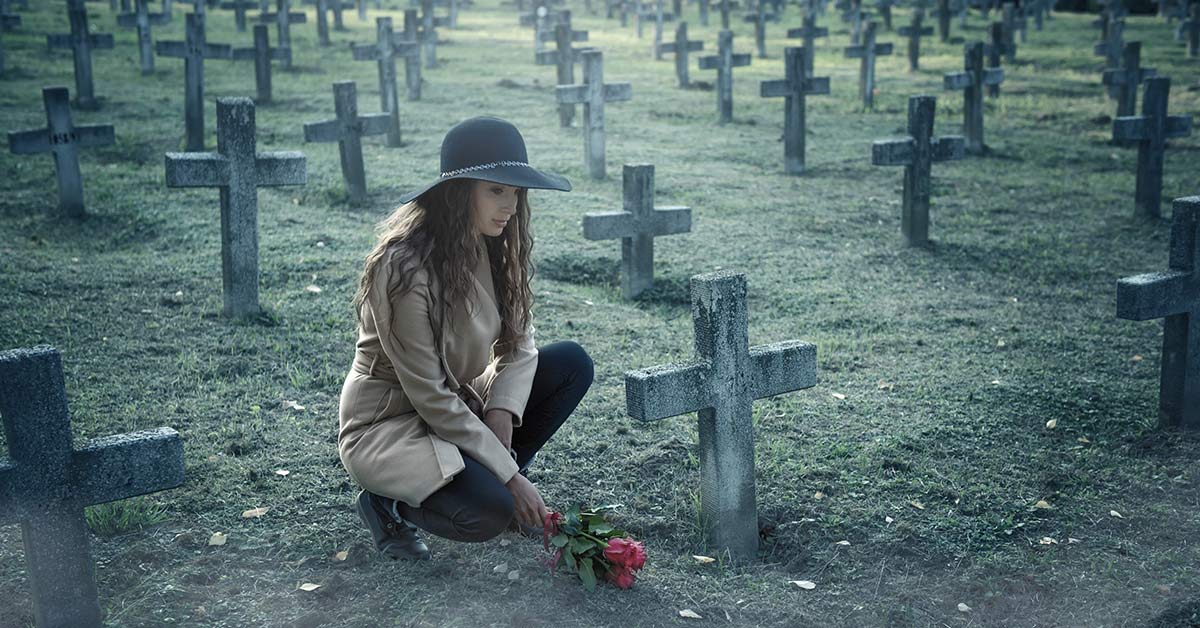Anyone who’s gone through the experience of losing someone close to them knows how difficult this experience is. Grief is a challenging emotion and everyone has their own way of working through it. When it comes to death, some prefer to talk about and tell stories about that person, others prefer to write in a journal, or perhaps post on either their own or the deceased person’s social media. Another method is to talk out loud to that person. If you’re part of this group and think you’re weird, don’t worry. Experts say talking out loud to a deceased loved one can actually be a very healthy way of handling your grief. (1)
Talking Out Loud To Deceased Loved Ones Is Good For Mental Health
Death is a difficult thing. Whether it is sudden or expected, it doesn’t make it any less painful. We’ve all got different ways of dealing with it, however, experts are saying that talking out loud to that person might just be one of the best.
“Speaking out loud to a loved one who has passed — whether at a grave site or out loud at home — is helpful for many people processing grief,” said Dr. Alison Forti, an assistant professor in the Department of Counseling at Wake Forest University. “I will sometimes encourage my clients to speak to an empty chair in an effort to help them cope with grief. Many people will experience a sense of disbelief after they lose a loved one. By encouraging people to speak out loud to their loved one it helps them resolve that disbelief.”
The Heart Takes Time To Heal
Licensed counselor Dr. Sherrie Campbell reminds us that the heart is not a fast-healing item. It takes time for the heart to let go. Often we feel as though we have many things we wanted to say but didn’t have the chance. There will be things – experiences, emotions, etc – that you want to share and get closure on. Talking out loud to this person can help get those things out.
“I tell my patients, young and old, that although our loved one’s may not be here in physical form, that they are right next door watching over us. We can find a sense of comfort in feeling that they are still close to us, conversations can still be had.” says Dr. Campbell.
Grief Is Not Linear
Another aspect of grief that Dr. Forti says is important to remember is that grief is not linear. Some days you might feel like you’ve made great strides, others you may feel as though you’ve taken two steps backward. That’s perfectly okay. (2)
“Many people have heard of the stages of grief and make a false assumption that grief is linear,” Dr. Forti said. “However, grief comes in waves and can hit people when they least expect it. People can actively grieve, move forward in life with their grief, years go by, and the simple smell of a perfume brings them back to an angry or sad moment of grieving.”
Grief also is not the same for everyone and not everyone has the same grief path (or more accurately, roller coaster). So don’t feel bad if you feel like you are taking longer to move forward than your friends or family. First of all, you probably aren’t seeing the whole picture of their sadness. Secondly, how you are affected by something and how long you need to feel somewhat normal again is going to be different from every single other person in the world. Don’t get caught up in feeling like you’re too fast or too slow. Just keep doing the personal work required for you to move forward and still enjoy your life.
Coping With Grief
Learning to cope with loss is something that everyone needs to learn. Grief isn’t something only reserved for death, either. Grieving will take place after a breakup or divorce, health crisis or job loss, retirement, trauma, moving, and so much more. You should never feel ashamed for grieving something, even if it seems like something small. A loss is a loss, no matter what. There are many things that people believe about grief that aren’t actually true. (3) These include:
- You need to “be strong” in the face of grief
- If you don’t cry, you aren’t sad
- If you ignore the pain it will go away faster
- There are rules about length of time for grieving (ex: 1 year, 1 month for every year you were with/knew that person, etc.)
- Moving on means forgetting about the loss
These are all false. Your grieving process is your own. Allow yourself to feel your emotions, which are all valid and normal. If crying isn’t your body’s response, that doesn’t mean you are sad or there is something wrong with you. Take the time you need and know that allowing yourself to be happy again doesn’t mean you’ve abandoned that person.
The Grieving Process
As I’ve said a few times, your grieving process is your own and will be different from everyone else’s. That being said, there are some important steps you need to take in order to move on in a healthy and healed manner. These are as follows:
- Acknowledge your pain.
- Accept that grief can trigger many different and unexpected emotions.
- Understand that your grieving process will be unique to you.
- Seek out face-to-face support from people who care about you.
- Support yourself emotionally by taking care of yourself physically.
- Recognize the difference between grief and depression.
You may experience feelings of shock, anger, disbelief, intense sadness, guilt, and fear. This is all normal and is okay. Grief often manifests itself physically, too. You might feel tired, nauseous, have a lowered immunity, lose or gain weight, have body aches, or have difficulty sleeping.
Go to friends or family for support – don’t try to do it alone. A licensed therapist may also be useful. Recognize that people will often feel awkward at first when trying to help you through your grief. It’s not because they don’t want to help, it’s just that it’s a difficult situation for everyone. You can also try joining a support group. Lastly, things like journaling, telling stories about that person, or talking to them out loud on your own can be very effective tools. Find what works for you and if you need more health go see a licensed counselor for more assistance.
Keep Reading: Japanese ‘Wind Telephone’ Lets You Talk To Your Lost Loved Ones
Sources
- “For Those in Grief, Talking to a Dead Loved One Is Good for Mental Health.” Teen Vogue. Adryan Corcione. August 30, 2018.
- “Speaking out loud to a dead loved one is actually good for you.” VT. Lily Hanson. May 28, 2019.
- “Coping with Grief and Loss.” Help Guide

